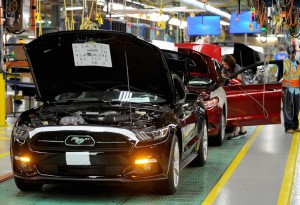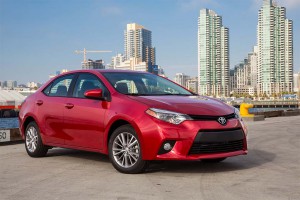
Automakers are amending their sales forecasts for 2016 and beyond as buyers do not appear to be as excited as previously believed.
With U.S. auto sales tumbling after three record years, General Motors will lay off 2,000 hourly employees at two assembly plants, one in Michigan, the other in Ohio, early next year. That follows a series of temporary plant closings by GM and rival Ford Motor Co.
The domestic new vehicle market slid about 8% in October, the latest in a series of downturns that both Toyota and Nissan this past week cited as major contributors to sharp declines in quarterly operating income.
Despite slumping demand, mounting inventories and a surge in costly incentives the U.S. market is still expected to hit an all-time record of somewhere in the mid-17 million range for all of 2016. But what might follow, if there isn’t a market rebound could pose an immediate challenge for Donald Trump, especially if turmoil following the divisive presidential campaign leads to a broader economic downturn.
“The market turned out to be somewhat weaker” than expected in the U.S., Toyota Executive Vice President Takahiko Ijichi told reporters Tuesday, offering one of the reasons why the carmaker’s operating profit fell 43% during the July to September quarter.
The Japanese maker’s problems weren’t entirely due to a declining market in North America. In fact, its SUV sales are up for the year, while its passenger models – such as the Prius, Camry and Corolla – have dipped. But, going forward, the overall trend is not a positive one, the maker fears, Ijichi stressing that the North American market “really requires very careful managing going forward.”
The possibility of a downturn has been increasingly apparent for months and is clearly not linked to the election alone. The U.S. market did, after all, hit an all-time peak for two years running, after climbing out of the worst recession in at least a half century, one that saw two of Detroit’s Big Three makers go bankrupt. And even though the market has been spotty in recent months, sales are still on track to set another all-time high for 2016.
(Auto industry issues will be high on the next president’s agenda. For more, Click Here.)
But LMC Automotive already cut its own forecast to 17.4 million vehicles, about 300,000, or 1.7%, lower than its earlier target.
“Our latest forecast now reflects the reality that the growth track that the U.S. market has been on since 2009 has stalled and appears to be levelling off,” Jeff Schuster, senior vice president Forecasting at LMC, said several months ago. On the positive side, Schuster cautioned that a wholesale slump in car sales is “not necessarily … imminent.”
Among the automakers questioning whether the U.S. market has crested are Detroit giants Ford and General Motors, as well as Japan’s second-largest maker, Nissan. Its own profits fell 19% during the most recent quarter, and it foresees a 40% decline for the fiscal year ending March 31.
“It’s a peak and we don’t see a potential for further (U.S.) growth,” Hiroto Saikawa, the co-CEO for Nissan – which is also the second-largest import brand in the States – said during a Monday earnings news conference.
Whether things will simply level off or start to slump could depend upon a variety of factors, including the aftermath of the presidential election. Financial markets have been shaky in recent weeks as the prospect of a victory by Donald Trump has grown, and things got off to a rough start when the election was called in his favor.
(Click Here for details about the slide in October car sales.)
Compounding any economic slowdown would be the prospect of higher interest rates, especially at a time when automakers have had to increase rebates and offer cut-rate loans to keep sales buoyed.
Automakers have been worried about the possibility of another rate hike by the Federal Reserve Board in the coming weeks. But even if the Fed chooses to hold off, nervous banks could tighten lending. That could become an even more serious problem if lenders in the U.S. or overseas start to fail. A lack of credit was one of the critical factors behind the 2008-2010 automotive downturn which saw sales dip below 10 million for the first time in decades.
“We cannot underestimate risk in this market,” wrote Takaki Nakanishi, an analyst with Jefferies Group LLC, in a report issued this week.
A slowdown in U.S. car sales would almost certainly, in turn, lead to job cuts, whether temporary or long-term. All three of the Detroit makers had been on a hiring binge in recent years, adding tens of thousands of jobs and making tens of billions of dollars in U.S. investments.
But Fiat Chrysler is dropping several slow-selling passenger car models, such as the Chrysler 200. Meanwhile, both Ford and GM have had to idle operations at a number of their American assembly plants in recent months, including the Mustang factory in Flat Rock, Michigan, due to slowing sales and mounting inventories.
(Falling used car sales may provide good value, but suspect safety. To see the story, Click Here.)
Barring a turnaround, the auto industry could present a serious challenge to the incoming president.


The auto industry must learn form the US airline industry, resist the temptation to expand on high demand. Now US airlines fly mostly full air craft but the auto industry, WORLD WIDE, is so bent on selling as many units as possible for the sake of growth and market share that profits take a big hit. The world has over capacity auto manufacturing and now with just the slightest slow down, everyone starts scrambling to save cost by shutting down or idle plants.